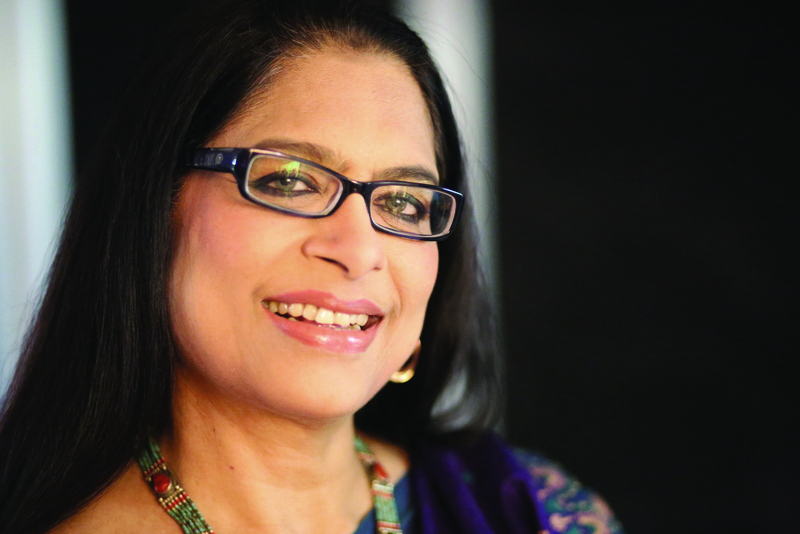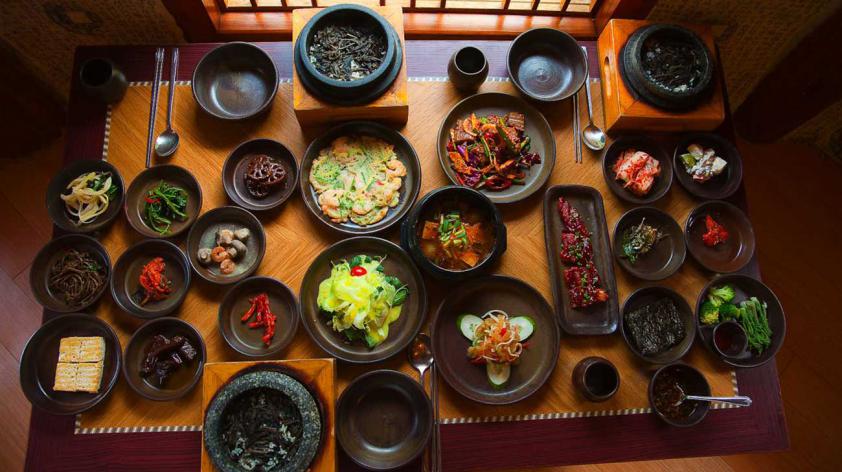Actor, business entrepreneur, writer and social activist Sara Amin, well known as Sara Zaker, became a household name in the 1990s for her remarkable performance in the popular Bangladesh Television drama series Ayomoy. Written by the famous writer Humayun Ahmed and directed by Nawazish Ali Khan, the TV drama changed the way how mainstream media perceived her.
Sara had already left her mark in the theatre decades ago when she was merely a college student. With utmost dedication and love for the theatre, Sara appeared in myriad theatrical acts since 1973.
However, for Sara Zaker, concerns for family life always eclipsed other engagements. She would spend more time with her family members who were also her co-activists on theatre as well as business partners. A career that went through many curves, saw Sara at the outset in the broadcasting and cinema. But, her dedication to theatre seemed to have transported her to broader social arena — she even found herself in the roles of advertising executive, social activist, etc.
The government awarded the theatre exponent with Ekushey Padak in 2017 for her contribution in the field of acting for more than four decades.
For her right-based activism, Sara was also honoured with Effie Award for Ending Child Marriage Campaign and Accolade Award for Ending Child Marriage Campaign in 2018.
Social communication is Sara’s favourite topic, an expertise that fed her activism as well as professional career. As a communication executive, she has built skills on social and behavioural change communication, social mobilisation and communication strategy development, besides her acting career.
In a nurturing environment
Sara was the third child of army officer Salahuddin Md Amin and Alia Amin. Both of liberal inclination, Salahuddin and Alia nurtured their children in an environment congenial to grow up pursuing careers of their own choice. In a conversation with New Age on February 5, Sara shared her childhood memories.
‘My father joined the British India Army few days before the India-Pakistan partition in 1947. After the partition, abba was transferred to the Army Staff College at Abbottabad in Pakistan where I was born in,’ she related.
Previously, a meritorious student of the Saint Xavier’s College in Kolkata, Salahuddin loved studying philosophy even when serving as a military officer. He was an attentive reader of the French philosopher Jean Paul Sartre. Besides this singular affection, his choice of books was rather eclectic.
‘The military life did not suit him. So he left the job in 1962,’ Sara said adding that his father decided to join the military job due to his teacher father’s insolvency in managing expenditures of an expanding family.
Sara’s grandfather Kazemuddin Ahmed for long had served as a philosophy professor of Islamia College of Kolkata and the University of Dhaka. She believes that if her father could continue his studies, which came to a halt when he joined the military, he would have been a philosophy scholar or English literary pundit.
After retirement, Salahuddin and his family shifted to Dhaka, the capital of the then East Pakistan.
Sara’s paternal family originated from northern district of Bogura. Despite a long stay in West Bengal, her grandfather and father used to converse in local dialect.
She recalled parents saying ‘My openness is an outcome of my parents’ support. I am open-minded and liberal enough to accept other’s opinion is just because of I am inheriting characteristics of my liberal father and mother.’
Alia still inspires her children with her grand and distinct personality. Sara even fails to narrate how Alia inspired her to become what she is today since this made her emotionally charged.
‘Still at her 85, amma loves to lead life independently,’ Sara said.
Alia is a Facebook maniac. ‘She is crazy about communicating with relatives and other acquaintances through the social media. Often elders think that Facebooking is harmful for children. But as Amma can explore her world sitting in a room, I think social media is a blessing for aged people like her,’ Sara describes her mother’s situation.
Alia could not carry out general studies after passing her higher secondary examination. As she had English medium schooling in Kolkata, she got a teaching job in Vikarunnessa School and College.
Extracurricular activities were Sara’s childhood obsession. She was so fortunate that her paternal family members used to appreciate art-related activities like painting, singing and acting. Additionally, her maternal family members were not conservative. ‘We did not face any restriction from both our paternal and maternal families,’ Sara said.
Her immediate elder brother Zahiruddin Md Alim is a writer-translator and the younger sister Sajeda Amin is a researcher.
Sara’s elder brother Allauddin Md Zaheen was obsessed about theatre. He was the pioneering art enthusiast in the family. According to Sara, Zaheen gained fame in acting when he was at his 20. He used to perform in English-based theatre plays like Waiting for Godot and Endgame by Samuel Beckett and Doctor Faustus by Christopher Marlowe during his student life.
Zaheen was a graduate student of Dhaka University’s English department when the Liberation War erupted in 1971. Sara’s family did not leave their hideout at Estakon Garden residence in the war-torn Dhaka as there were aged people along with two orphan cousins — the soft targets of the occupying Pakistani Army.
On March 27, Zaheen, determined to join the freedom fighters, left home.
Sara harked back to the tumultuous days, ‘As he was tall and fair compared with the common Bengalis, he could dodge the Pakistan army’s vigilant gaze. However, he attempted to join the Liberation War for the second time on April 5 and disappeared forever. We could trace him last when he was in Chandpur.’
Preserving Zaheen’s memory was always at the back of Sara’s mind although she failed to share her thought with others.
‘I was merely 18, had just appeared in the secondary school certificate examination. Our family friend Naila Zaman (freedom fighter) introduced me to Nagorik Natya Sampradaya in 1972. Naila’s father and ornamented war veteran Quazi Nooruzzaman requested my father to allow me to take part in theatre activities apprehending that I would learn Bangla well by becoming a cultural practitioner. Abba admired Nooruzzaman uncle most. Hence, he approved of my joining the theatre,’ She recalled.
Passion for acting
In 1972, Sara gave audition for Dhaka Radio while performing in the play Doctor Faustus. Nagarik founding president Zia Hayder directed the play. That was the first and probably the last participation of Sara in radio.
Sara Zaker’s important theatrical performances include Baki Itihas, Shen Te or Shui Ta, an adaptation of Brecht’s Der Gute Mensch von Sezuan, Bidagdha Ramanikul, Nishiddha Palli, Syat Manusher Khoje, Dewan Gazi’r Kischha and Naam-Gotraheen: Manta’r Meyera and Irsha.
Baki Itihas (1973) was the first-ever ticketed show in the contemporary theatre history in Dhaka. For the series of shows of the play, Nagarik had booked the British Council auditorium for eight consecutive evenings.
Sara recalled, ‘We were committed to continue the theatre show without mulling over financial return.’ The play was directed by Aly Zaker, whom Sara married in 1975.
In the year of marriage, Sara enrolled into the biochemistry department of Dhaka University. Next year, she gave birth to Iresh Zaker. She said, ‘After Iresh came in, I became afraid of carrying out biochemistry studies because the subject required spending a lot of time on laboratory exercises, which was very inconvenient for looking after toddler Iresh. Moreover, physics and mathematics were my subsidiaries. The two subjects seemed tougher than biochemistry to me. I was confused as to how I would manage everything. Hence, I had decided to switch to the English Literature in the same university.’
Aly Zaker was then an employee of East Asiatic. He bought the company in 1977.
When Iresh was two and half years old, Sara got a call from her Nagorik co-activist Badal Rahman for acting in his juvenile film Emiler Goenda Bahini.
Sara said, ‘I was not like the present day actors who are serious about acting in the movies. I had just responded to Badal’s call out of courtesy.’
Emiler Goenda Bahini was released in 1980.
In 1981, Sara visited United Kingdom to participate in a three-month directorial course under the British Theatre Institute.
One year after the course ended, Sara started her post-graduation studies on English Literature in Dhaka University. Sara conceived her second child at that time.
A diversified career
After the birth of her daughter Shreya Sharbojoya in 1985, Sara became worried over her future career. Sensing her mental anxiety, Aly offered Sara a position at his business venture. However, Sara was reluctant to work in an advertising firm. Hence, she began her corporate career in the field of market research and joined at Market Research Consultancy Mode Limited. Till 1996, she served the company as its managing director.
She took part in a management workshop jointly organised by Institute of Business Management and UNICEF in 1988. Next year, she attended a conference at National Council of Research on Women in the US. Ford Foundation sponsored her participation.
In 1996, Sara starred in another film — Nodir Naam Modhumoti. The film was directed by Tanvir Mokammel.
‘I was dedicated to theatre. I performed in Badal and Tanvir’s films on request. When Tareque Masud and Catherine Masud came to me for acting in their drama film Ontarjatra, I took the call very seriously. I took movie acting seriously when I was old enough to groom myself as a movie star,’ Sara confessed.
Ontarjatra was released in 2005 and received appreciation by both audience and critics.
However, Sara does not rue over for not becoming a prominent movie star, as she believes that a person busy in more than one job cannot be a master of all.
Since her three-decade business career, she also worked as the project head of Nayantara Communications since its inception in 2004. Nayantara is the co-producer of Sesame Workshop New York and is responsible for producing Sisimpur, the Bengali edition of the Sesame Street.
In addition to her other engagement, Sara served as the executive director of Asiatic Marketing Communications Limited, director of Asiatic Events Marketing Limited, and the managing director of Dhani Chitra Ltd.
Since 2012, Sara has been serving as the group vice chairperson of Asiatic 3sixty (Asiatic Group of Companies). She has to undertake core responsibilities including operational leadership, strategic direction and business quality control of the group of companies.
Albeit being a busy corporate professional, Sara is engaged in social activism — she prioritises women and children rights-based campaign for positive change.
Sara is among the founding trustee board member of the Liberation War Museum established in 1996 in Dhaka. She served as chairperson of Group Theatre Federation between 2002 and 2004.
She has directed Mukhosh-an adaptation of Ariel Dorfman’s Death and the Maiden, Anton Chekhov’s The Sea Gull and Open Couple — an adaptation of Dario Fo and Franca Rame’s The Open Couple.
Sara has a plan to publish her columns Shubondhu Shomipeshu which was serialised in daily Prothom Alo.
Source:
http://www.newagebd.net/article/64822/sara-zaker-one-woman-many-roles

